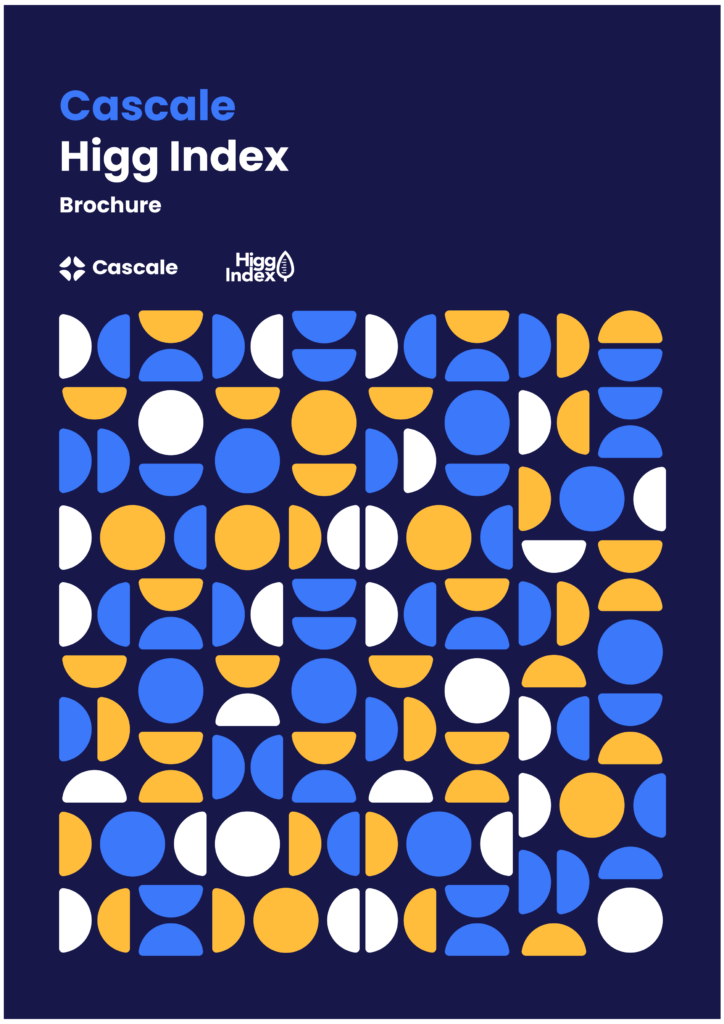
Dear Fashion: Let’s Step Up and Get Aligned
In a recent opinion editorial with WWD, CEO Colin Browne argues fashion needs to take more serious and coordinated action on sustainability. Read the highlights here!
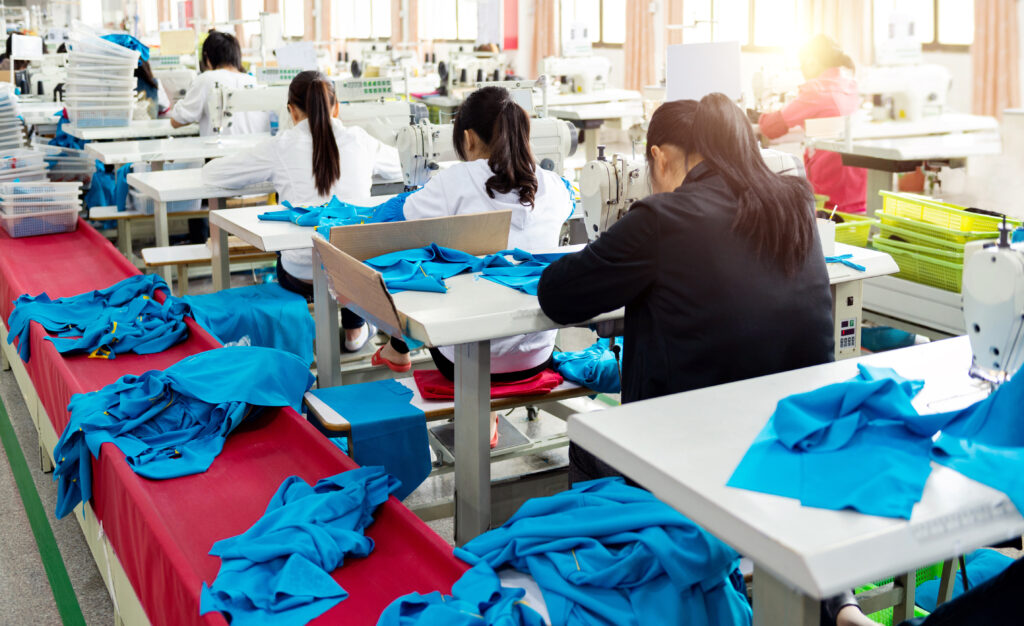
San Francisco, Amsterdam, Hong Kong – November 2, 2023: Today, in partnership with Worldly, the Sustainable Apparel Coalition (SAC) launched the Higg Facility Environmental Module (FEM) 4.0 tool. This update marks an industry milestone in sustainability reporting to meet pressing environmental issues and industry standards, positioning Higg FEM 4.0, part of the Higg Index suite of tools, as the most applicable and leading assessment for environmental performance in the consumer goods industry.
Enabling more accurate reporting
As well as offering improved and more streamlined usability, Higg FEM 4.0 delivers better data quality. Featuring a new anomaly detector designed to flag inconsistencies, Higg FEM 4.0 provides more accurate reporting, ultimately enabling a more accurate environmental assessment of the industry.
Broader coverage of critical environmental issues
The tool also offers a deeper look at key environmental issues such as groundwater and soil contamination to help the industry make improvements at a global scale on critical issues. The new tool aligns with key global standards – including the GHG Protocol, the SBTi, and ZDHC Roadmap to Zero – to drive emissions reductions and reduce duplicative reporting. Additionally, Higg FEM 4.0 includes targeted questions that are more relevant to a facility’s processes, weeding out questions that are irrelevant.
Jeremy Lardeau, VP of the SAC Higg Index says, “Higg FEM 4.0 will bring impactful and necessary changes – from improved data quality to alignment with relevant industry standards, the updated tool offers a wide range of benefits to ultimately reshape how sustainable decisions are made along the supply chain.”
Industry led update
Higg FEM 4.0 was built on member and stakeholder feedback collected over the past two years It reflects the input of over 140 representatives across 12 Member Expert Teams (METs), including 62 representing manufacturers, 57 representing brands/retailers, 10 service providers, and five representing affiliate members. The METs, the FEM Strategic Council, partner organizations, and members all provided insights and feedback. The insights collected helped to shape the FEM framework, scoring methodology, question content, and more to build a tool that meets relevant industry standards and protocol. Additionally, Higg FEM 4.0 was tested by over 400 users who provided feedback within the platform. The SAC is excited for end users and stakeholders to experience the widespread benefits of Higg FEM 4.0, and empower them to identify, prioritize and scale sustainability efforts.
Jimmy Summers, Vice President of Environmental, Health, Safety & Sustainability, at Elevate Textiles: “Elevate Textiles is looking forward to the release of Higg FEM 4.0. Higg FEM is an essential part of transparently sharing our verified sustainability metrics and progress with our customers. We also use Higg FEM as a foundational element of our overall sustainability program to ensure that all of our facilities around the world are meeting our expectations and improving their performance towards our facility-level and corporate goals and targets, including our Science-Based Targets for GHG reductions. We actively participated in the Higg FEM 4.0 pilot and are now prepared to ‘raise the bar’ with this more rigorous and beneficial version.”
Alan Chin, Senior Manager, Supply Chain Sustainability, at VF Corporation: “At VF, the Higg FEM assessment enables the company and our brands to measure key Scope 3 supplier-related impacts. VF teams, along with the SAC staff, engage directly with our vendor partners to assess and improve supplier carbon emissions. We are excited about the enhanced ability of the updated Higg FEM 4.0 to deliver actionable data and insights, enabling VF to support impact reductions across our global supply chain.”
James Schaffer, Worldly’s Chief Strategy Officer: “Higg FEM 4.0 is a game changer. In an industry with rapid change in impact reporting and regulation disclosure requirements, Higg FEM 4.0 directly addresses the current sustainability challenges and future needs businesses are facing. We’re proud to host this leading environmental assessment on the Worldly platform and provide businesses the impact intelligence they need. With new customized user experiences for facilities, Higg FEM 4.0 is an assessment tailored to facilities that gives brands visibility into the nuanced impact of their supply chain partners, so together they can identify hotspots and effectively improve their environmental footprint.”
Kyle Chung, Senior Manager – Sustainability, at Crystal International: “Crystal International’s sustainability efforts are strengthened by industry tools like Higg FEM to enhance environmental performance. Collaborating with our supplier network to leverage Higg FEM data and insights, we can make informed decisions to drive sustainability advancement across our operations and value chain. With the launch of the updated tool, we are better equipped to address the industry’s most pressing issues.”
— ENDS —
About the Higg FEM Tool
The Higg Facility Environmental Module (FEM) tool informs manufacturers, brands, and retailers about the environmental performance of their individual facilities, empowering them to scale sustainability improvements. The Higg FEM provides facilities a clear picture of environmental impacts and helps users identify and prioritize opportunities for performance improvements.
About the Sustainable Apparel Coalition
The Sustainable Apparel Coalition (SAC) is a global, non-profit alliance of over 280 organizations in the apparel, footwear, and textile industry. Initially formed to create standardized sustainability metrics, the SAC has sharpened its focus to driving pre-competitive, collective action across three foundational pillars. As an independent entity, the SAC brings together brands, retailers, manufacturers, NGOs, academics, and industry associations to combat climate change, ensure decent work, and contribute to a nature-positive future. Central to the SAC’s mission is the Higg Index, a suite of comprehensive tools that empower members to measure, evaluate, and improve sustainability performance across the supply chain.
LinkedIn | Twitter | Instagram | Facebook | YouTube
About Worldly
Worldly is the planet’s most comprehensive impact intelligence platform, trusted by 40,000+ major brands, retailers, and manufacturers in fashion, outdoor, home goods, toys, and more. Worldly uniquely collects high-resolution primary data specific to companies’ value chains, operations, and products, providing insight into true impacts across carbon, water, chemistry, and labor. Featuring the most comprehensive source of ESG data for global manufacturers and the largest library of materials and product impacts, Worldly empowers businesses to scale responsibility into their global operations, faster and more accurately. Hosting, connecting with, and supporting the leading industry solutions and methodologies including ZDHC, Bluesign, and the Higg Index – the most widely-adopted measure of sustainability in the apparel industry – Worldly delivers the insights businesses need to reduce their impact, comply with emerging regulatory and financial disclosure requirements, and meet the expectations of a new generation of customers. www.worldly.io
For media enquiries or to request an interview, please contact: Florence@forster.co.uk or joeldelgesso@forster.co.uk
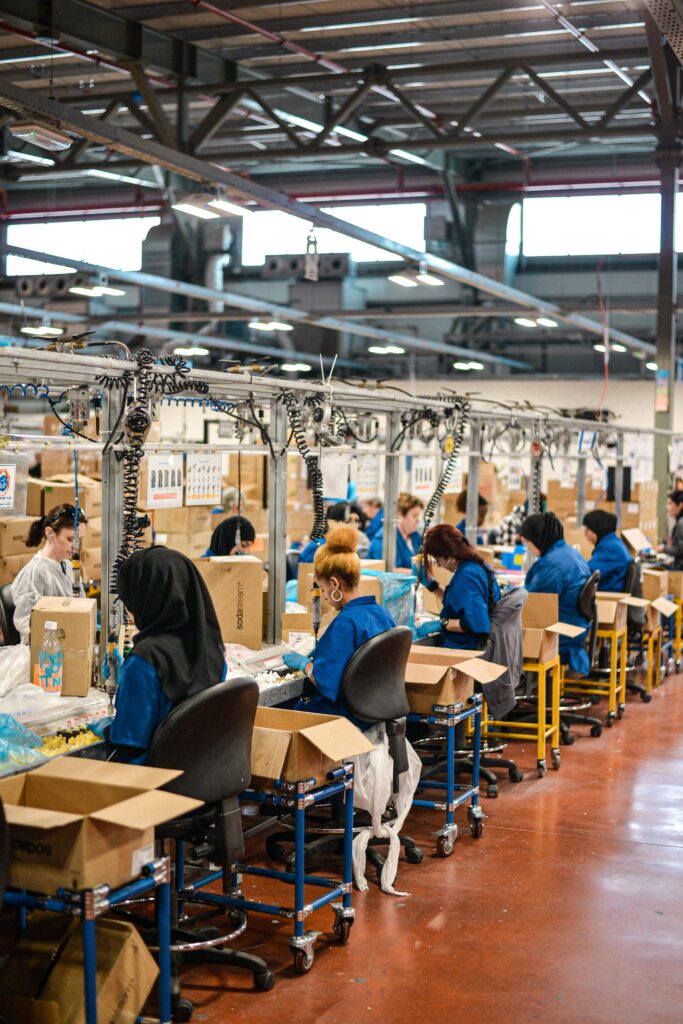
The German Agency for International Cooperation, the service provider in the field of international cooperation for sustainable development, recently hosted a webinar to highlight key changes between Higg FEM 3.0 and the forthcoming Higg FEM 4.0. Moderated by Rakesh Vazirani, head of sustainability services for business stream products, the webinar included Angela Ng, director of Higg Facility tools, in conversation with Mohammad Abdul Qaium, sustainability manager at OVS S.p.a., and Arunhariharan B S, sustainability analyst at Eastman Exports Global Clothing. The discussion was designed to educate attendees about what additional data manufacturers should start collecting for Higg FEM 4.0 in order to be better positioned to complete the self-assessment and verification, as well as how to best use the tool to drive impact. “The industry overall has certain goals for sustainability,” Vazirani said. “There are goals with regards to reduction of emissions, there are goals with regards to reduction of freshwater, and there are goals with regards to ensuring that biodiversity is not being negatively impacted. And of course the big picture goal is to have a circular textile value chain.”
Although the subject matter was high-level and technical, Ng noted the deep level of collaboration between SAC members that culminated in the update. “We spent the last two to three years working with over hundreds of members, stakeholders and facility users to collect feedback on the tool framework, scoring methodologies and all the questions’ content,” Ng said. “These insights coming from our key Member Expert Teams and Strategic Councils helped us identify gaps in regulations, industry standards and needs and incorporate these into the new version of the Higg FEM 4.0.”
As Ng detailed, this work fits into the SAC’s broader vision of “Evolution for Impact” to drive scalable solutions for industry-wide decarbonization. As Qaium shared, OVS demonstrated this by introducing a Sustainability Linked Bond in 2021 and setting goals to achieve a 21 percent reduction in carbon emissions and ensure that 100 percent of their suppliers use the Higg FEM and Higg FSLM, with 80 percent of their volume verified by 2024.
Ng also explained framing around key changes to Higg FEM 4.0, including an increase in data points: Over 70 unique data points are part of the Higg FEM 4.0 update, including site permits, energy, water, emissions, waste and chemical management. Although industry progress is gradually improving -– the percentage of users meeting Higg FEM foundational requirements was 19 percent in 2022, versus 15 percent in 2021 -– Ng emphasized that the SAC views Higg FEM 4.0 as a game-changer for industry-wide progress. Through a single shared facility assessment tool, Higg FEM 4.0 is designed to reduce facility third-party assessments, fuel better quality data and align industry benchmarking. As Arunhariharan detailed, once the Higg FEM is adapted to the user’s facility, they will be able to set targets and understand barriers to achieving them.
Ng also touched on how the Higg FEM 4.0 aligns with key industry standards -– including the Greenhouse Gas (GHG) Protocol, Science-Based Targets initiative, and Zero Discharge of Hazardous Chemicals Roadmap to Zero -– as well as how the updated tool zeroes in on the most critical environmental impacts like groundwater contamination to ensure that it reflects the key impact areas where businesses need to evaluate and address current challenges.
Additionally, she talked about the improved assessment relevance. Through improved applicability criteria, users will now only see questions relevant to their specific operations, so they can spend less time on assessment questions that are irrelevant to them.
Finally, she discussed how the findings from Higg FEM 4.0 can be applied at scale. Once facility impacts are known, volume can be allocated to low-carbon suppliers -– a tactic that is already being seen among industry players. For example, Ng shared a recent analysis of Higg FEM data by carbon management company Reset Carbon which found the top 1,500 facilities contribute to around 79 percent of total emissions or some 82.8 million tons of carbon dioxide equivalents. In the best case scenario, the industry can see an estimated 10 to 25 percent carbon reduction by shifting sourcing. By tapping insights from Higg FEM 4.0, devoting jobs to the most sustainable suppliers, the hope is that industry players see drastic improvement.
The SAC has scheduled a series of events that focus on the Higg FEM 4.0 update, including a webinar on November 7 and an APAC session on November 8.
This training provided users of the Higg FEM the opportunity to better understand the changes that will be made as we transition from the Higg FEM 3.0 to the Higg FEM 4.0.
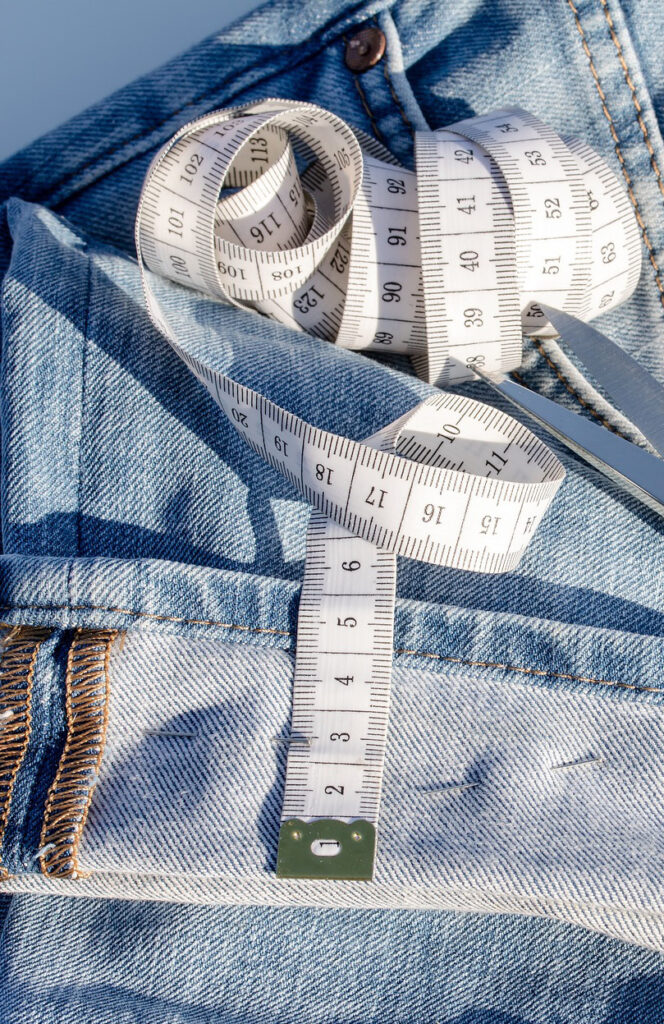
The SAC is excited to launch the Higg FEM 4.0 in November, providing a transformative shift in sustainability reporting for manufacturing facilities, brands and retailers. This dynamic tool has the potential to significantly change how and why decisions are made within the industry, and we want to make sure you have everything you need ahead of November’s launch. In partnership with Worldly, the SAC is excited to share a dedicated Higg FEM 4.0 webpage to bring you all the latest resources, key dates and updated information —all in one place.
Higg FEM 4.0: Major Updates
Updating Higg FEM 4.0 was a highly collaborative effort among SAC members. Over the past two years, we’ve worked with over 100 members to collect feedback on tool framework, scoring methodology and content. Insights from key Member Engagement Teams and the Strategic Council helped us to identify gaps in regulations, industry standards and needs, and incorporate member insights in order to significantly evolve the tool.
We view Higg FEM 4.0 as a gamechanger — here’s why:
How to Prepare for Higg FEM 4.0
To help users prepare for Higg FEM 4.0, we’re thrilled to introduce a consolidated webpage where manufacturers, brands and supply chain partners can access important resources and critical information. In partnership with Worldly, we’ve developed a Higg FEM 4.0 webpage as a one-stop resource for all Higg FEM 4.0 announcements and training materials.
Visit https://go.worldly.io/learn-about-higg-fem-4.0 to learn more about the Higg FEM 4.0 update and explore need-to-know information ahead of the launch in November.
Key webpage features include:
With in-depth training and content tailored to best prepare you ahead of time, the SAC and Worldly are prepared to help you navigate all changes, big and small. We’re excited to launch a tool that will better shape how decisions are made within each facility, and also drive the industry forward as a whole. Together, we’re not just meeting sustainability standards; we’re setting them.
WHO WE ARE:
The Sustainable Apparel Coalition (SAC) is an industry-wide nonprofit alliance whose collective action efforts lead the consumer goods industry toward a more equitable and restorative future. The SAC owns and develops the Higg Index, a suite of tools that provides a standardized framework for organizations to assess sustainability impact throughout the product life cycle. Over the past decade, the SAC has focused on building and evolving the methodologies of the Higg Index using the latest scientific research, in collaboration with SAC members, consultants, stakeholders, industry experts, and ecosystem partners, such as Worldly. To learn more about the Higg Index, visit https://cascale.org/the-higg-index/.
Worldly is the planet’s most comprehensive impact intelligence platform, trusted by 40,000+ major brands, retailers, and manufacturers in fashion, outdoor, home goods, toys, and more. Worldly uniquely collects high-resolution primary data specific to companies’ value chains, operations, and products, providing insight into true impacts across carbon, water, chemistry, and labor. Featuring the most comprehensive source of ESG data for global manufacturers and the largest library of materials and product impacts, Worldly empowers businesses to scale responsibility into their global operations, faster and more accurately. Hosting, connecting with, and supporting the leading industry solutions and methodologies including ZDHC, Bluesign, and the Higg Index – the most widely-adopted measure of sustainability in the apparel industry – Worldly delivers the insights businesses need to reduce their impact, comply with emerging regulatory and financial disclosure requirements, and meet the expectations of a new generation of customers. www.worldly.io
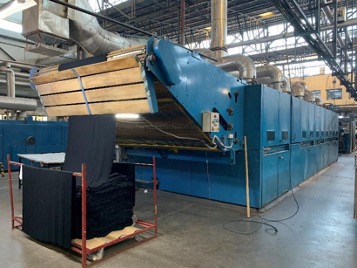
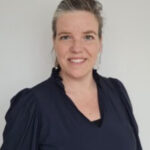
Current fashion supply chains are highly polluting and wasteful, making the fashion industry one of the most unsustainable industries. In order to measure and quantify the sustainability impacts of a manufacturing facility, the SAC’s Higg Facility Environmental Module (FEM) is a valuable tool. The Higg FEM offers standardized measurements for sustainability and helps manufacturers, brands, and retailers identify and prioritize opportunities for performance improvements through the use of a common language.
However, acting on the data can sometimes be a financial challenge for manufacturers. Although sustainable technology solutions exist today, manufacturers often lack the knowledge or capital to invest in such machinery to improve their production processes. The Good Fashion Fund (GFF), a first-of-its-kind initiative by Laudes Foundation, was established to create systemic change in the textile and apparel industry by encouraging mainstream uptake of impactful and disruptive production technologies. The fund provides long-term USD loans to apparel and textile manufacturers in India and Bangladesh to enable them to implement innovative and sustainable technologies.
The first loan by the GFF was made to Pratibha Syntex in 2021. By the first monitoring visit in November 2022, the impact results surpassed the targets of a minimum of 50% savings. At the end of 2022, another loan was signed with Progress Apparels in Dhaka, and the GFF expects to close three more loans—one in Bangladesh and two in India—by the end of the quarter. The investments are diverse and relate to the enhancement of effluent treatment plants, the adaptation of state-of-the-art spinning and weaving equipment, the installation or replacement of washing unit equipment, and the expansion of unique waste-to-yarn recycling facilities.
The technology we finance relates primarily to equipment for dyeing, washing, printing, and wastewater treatment and reduces the use of hazardous chemicals, water, or energy in the production process. Every GFF investment should lead to a minimum of 50% reduction in consumption of one of our three environmental goods: Good Energy, Good Water, or Good Materials (incl. chemicals).
The GFF is unique in its focus on sustainable and ethical fashion and we’re proud to be the first financial investor to join the SAC’s global membership, utilizing the Higg FEM as a key part of our environmental due diligence process. The Higg FEM measures the exact environmental impacts of a facility’s operations that we aim to improve, such as water use, energy consumption, greenhouse gas emissions, waste management, and chemical management. It aligns perfectly with the GFF’s objectives.
In particular, the Higg FEM assesses a facility’s overall Environmental Management Systems and specifically gathers data on energy use, greenhouse gas emissions, water use, wastewater, air emissions, waste management, and chemical management. The score not only reflects absolute levels but particularly focuses on encouraging improvements and setting baseline levels and targets.
Having a verified Higg FEM score allows us at the GFF to limit our environmental due diligence efforts to desktop research and interviews conducted by our advisors Sphera and TUV Rheinland. When a facility is new to the Higg Index, our due diligence is more extensive and includes a site visit, but, ultimately, the manufacturers and operators in which we invest must receive a verified Higg FEM score. This allows the company to create value from the exercise and publicly communicate the results.
It is a complex analysis and will require continuous development. We are confident the SAC will maintain and leverage its close partnership with its member retailers, brands, manufacturers, and other stakeholders to continue improving and increase levels of adoption.
Moreover, the GFF uses the Higg FEM score, not only for the initial investment decision but also to better monitor continuous performance over the lifetime of our partnership with the manufacturer. As the Higg Index becomes more widely recognized and adopted, we will be able to more effectively communicate the sustainability performance of the portfolio companies to our investors. More importantly, it will help the manufacturers communicate their improved sustainability performance to consumers. The investments funded by the GFF typically improve a facility’s Higg FEM score substantially.
Our partner at TUV Rheinland, Rakesh Vazirani, Global Head of Sustainability Services, Consumer Products, noted: “Every facility we encounter for environmental due diligence is eager to make improvements to positively impact its environmental performance KPIs/metrics to showcase its progress, to explore cost savings, to highlight its uniqueness to customers, and to prepare for future regulation. Relying on existing industry frameworks like Higg FEM allowed facilities’ performance to be measured based on a harmonized framework; and GFF’s approach to fund improvements to make an impact fit into the wider mission of factories, local governments, and brands. We look forward to the continuous evolution of the Enhanced Due Diligence (EDD) framework to add efficiency to the process, and further alignment with European Green Finance taxonomy.“
Of course, the assessment and improvement of working conditions and labour rights are equally important aspects of the GGF’s objectives. Currently, the social due diligence is being performed by Fairwear Foundation, and important topics such as labor policies, health and safety conditions, workers committees, adequate administration and execution of contracts, salary management and working hours, grievance mechanisms, and anti-discrimination policies are being reviewed on site. In one of the more recent transactions, for the first time, the social due diligence included assessing the company’s verified scores of the Higg Facility Social & Labor Module (FSLM). Given social audits are at least as intensive for a company to accommodate as the environmental due diligence, we are exploring the possibilities of the Higg FSLM verification as more brands and manufacturers adopt the standard.
The GFF is dedicated to creating systemic change in the fashion industry, not only by the direct impact of its investments but also by sharing experiences and lessons learned widely. We aim to create partnerships with other actors in the fashion industry and financial sector, drive awareness of opportunities for sustainable technologies, and catalyze finance. GFF will continue to report on its investee companies extensively, encouraging further use of standardized measurements including the Higg FEM and Higg FSLM scores.
The purpose of this Technical Paper is for Higg FEM users to start understanding and preparing for the next version of the Higg FEM (“Higg FEM 4.0”), which will officially be released on the Higg platform in November 2023. Facilities will start reporting their 2023 performance using the FEM 4.0 framework.
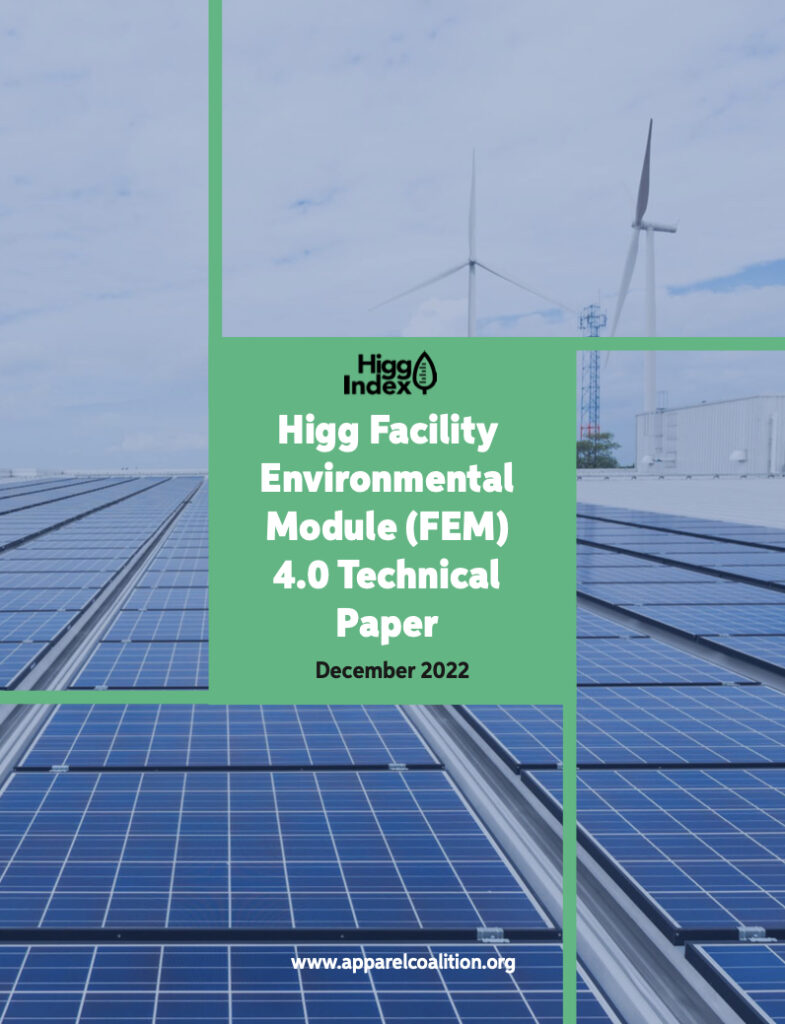
Learn more about the business value and benefits of the Higg Index.
